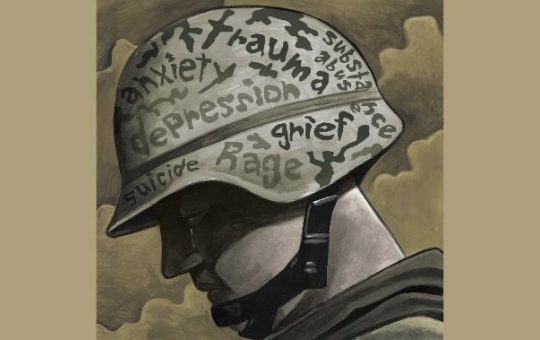Terminale > Mission Bac LLCER Anglais > Mes sujets de bac > Expression et construction de soi
EXPRESSION ET CONSTRUCTION DE SOI
Exercice d'application
Annales
-
Thème « Expression et construction de soi ».
Partie 1 :
Prenez connaissance des documents A, B et C et traitez le sujet suivant en anglais :
Write a commentary (about 500 words): taking into account the specificities of the three documents, analyse how they illustrate the impact of war on individuals.
Partie 2 :
Traduisez le passage suivant du document A en français :You don’t see or hear like you used to. Your brain chemistry changes. You take in every piece of the environment, everything. I could spot a dime in the street twenty yards away. I had antennae out that stretched down the block. It’s hard to even remember exactly what that felt like. I think you take in too much information to store so you just forget, free up brain space to take in everything about the next moment that might keep you alive. And then you forget that moment, too, and focus on the next. (l. 23-29)
DOCUMENT A
So here’s an experience. Your wife takes you shopping in Wilmington. Last time you walked down a city street, your Marine on point went down the side of the road, checking ahead and scanning the roofs across from him. The Marine behind him checks the windows on the top levels of the buildings, the Marine behind him gets the windows a little lower, and so on down until your guys have the street level covered, and the Marine in back has the rear. In a city there’s a million places they can kill you from. It freaks you out at first. But you go through like you were trained, and it works.
In Wilmington, you don’t have a squad, you don’t have a battle buddy, you don’t even have a weapon. You startle ten times checking for it and it’s not there. You’re safe, so your alertness should be at white, but it’s not.
Instead, you’re stuck in an American Eagle Outfitters. Your wife gives you some clothes to try on and you walk into the tiny dressing room. You close the door, and you don’t want to open it again.
Outside, there’re people walking around by the windows like it’s no big deal. People who have no idea where Fallujah is, where three members of your platoon died. People who’ve spent their whole lives at white.
They’ll never get even close to orange. You can’t, until the first time you’re in a firefight, or the first time an IED1 goes off that you missed, and you realize that everybody’s life, everybody’s, depends on you not fucking up. And you depend on them.
Some guys go straight to red. They stay like that for a while and then they crash, go down past white, down to whatever is lower than “I don’t fucking care if I die.” Most everybody else stays orange, all the time.
Here’s what orange is. You don’t see or hear like you used to. Your brain chemistry changes. You take in every piece of the environment, everything. I could spot a dime in the street twenty yards away. I had antennae out that stretched down the block. It’s hard to even remember exactly what that felt like. I think you take in too much information to store so you just forget, free up brain space to take in everything about the next moment that might keep you alive. And then you forget that moment, too, and focus on the next. And the next. And the next. For seven months.
So that’s orange. And then you go shopping in Wilmington, unarmed, and you think you can get back down to white? It’ll be a long fucking time before you get down to white.
Phil Klay, Redeployment, 2014
1 IED = improvised explosive device
DOCUMENT B
Our brains ache, in the merciless iced east winds that knive us...
Wearied we keep awake because the night is silent...
Low drooping flares confuse our memory of the salient...
Worried by silence, sentries whisper, curious, nervous,
But nothing happens.Watching, we hear the mad gusts tugging on the wire,
Like twitching agonies of men among its brambles.
Northward, incessantly, the flickering gunnery rumbles,
Far off, like a dull rumour of some other war.
What are we doing here?The poignant misery of dawn begins to grow...
We only know war lasts, rain soaks, and clouds sag stormy.
Dawn massing in the east her melancholy army
Attacks once more in ranks on shivering ranks of grey,
But nothing happens.Sudden successive flights of bullets streak the silence.
Less deadly than the air that shudders black with snow,
With sidelong flowing flakes that flock, pause, and renew,
We watch them wandering up and down the wind’s nonchalance,
But nothing happens.Pale flakes with fingering stealth come feeling for our faces—
We cringe in holes, back on forgotten dreams, and stare, snow-dazed,
Deep into grassier ditches. So we drowse, sun-dozed,
Littered with blossoms trickling where the blackbird fusses.
—Is it that we are dying?Slowly our ghosts drag home: glimpsing the sunk fires, glozed1
With crusted dark-red jewels; crickets jingle there;
For hours the innocent mice rejoice: the house is theirs;
Shutters and doors, all closed: on us the doors are closed, —
We turn back to our dying.Since we believe not otherwise can kind fires burn;
Now ever suns smile true on child, or field, or fruit.
For God’s invincible spring our love is made afraid;
Therefore, not loath, we lie out here; therefore were born,
For love of God seems dying.To-night, this frost will fasten on this mud and us,
Shrivelling many hands, and puckering foreheads crisp.
The burying-party, picks and shovels in shaking grasp,
Pause over half-known faces. All their eyes are ice,
But nothing happens.Wilfred Owen, Exposure, 1918
1 Glozed = covered with
DOCUMENT C

Author unknown, NewsArt, 2022
